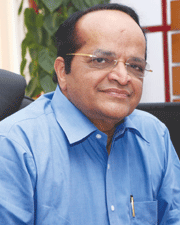Autar Nehru interviewed Dr. V.N. Rajasekharan Pillai, vice chancellor of IGNOU, in Delhi. Excerpts:
 IGNOU recently celebrated its silver jubilee. What were the objectives behind the promotion of IGNOU 25 years ago? To what extent have these objectives been attained?
IGNOU recently celebrated its silver jubilee. What were the objectives behind the promotion of IGNOU 25 years ago? To what extent have these objectives been attained?
The objectives behind the pro-motion of IGNOU 25 years ago were advancement and dissemination of knowledge and learning by diverse means. The open university and distance education systems were the strategies adopted to attain these objectives of providing higher education access to disad-vantaged groups such as those living in remote and rural areas, working people, housewives and adults who wished to upgrade their knowledge and skills. IGNOU’s founding principles were social inclusion and democrati-sation of education and provision of vocational education at all levels.
During the past 25 years the university has substantially fulfilled these objectives. IGNOU is now the world’s largest university with over 2.89 million students on our rolls.
Only 12 percent of Indian youth in the age group 18-24 are enroled in higher education institutions currently as against over 60 percent in the US and 25 percent in China. To what extent has IGNOU been able to increase the supply of higher education opportunities for Indian youth?
IGNOU’s contribution to total enrolment in the higher education system is approximately 15 percent. During the period January-July 2009, as many as 608,614 students enroled with IGNOU which currently has 2.89 million students. Another major contribution of IGNOU is its inclusive philosophy reflected in significant enrolment of learners from socially disadvantaged groups.
Nevertheless there is a question mark over the quality of distance education programmes as compared to certification obtained from bricks-and-mortar institutions. To what extent is this prejudice justified?
The question mark is over education quality in general; it’s not restricted to distance education. It’s a live issue in conventional bricks-and-mortar instit-utions also. There may be distance education institutions delivering low quality education just as there are in the conventional education system. If we do a cost-quality comparison of a cross-section of conventional and distance education institutions, my feeling is that distance education will come out better.
The general perception is that technologically IGNOU is not quite on a par with western and far east distance education organisations. What’s your comment?
To compare Indian with western and far east distance education institutions is to compare uncomparables. The Indian system has to respond to size and diversity, both huge challenges. Diversity is reflected in the number of languages, cultures and Centre-state relations. The investment in distance education particularly in western countries is very high. Having said so, I agree that there is considerable scope for intensifying the use of technology in our system as well.
Somewhat belatedly there is a sharp focus on skilling India’s 509 million-strong workforce and youth population. To what extent, if any, Is IGNOU involved in vocational education and training?
The Central government has declared 2010-2020 as the Decade of Innovation during which the country needs to achieve inclusive and sustainable growth in education, skills develop-ment, healthcare, energy, agriculture and infrastructure. IGNOU’s approach will be to design learning and training modules, courses and programmes under which learners can pay skill providers directly, and make the knowledge and skills acquired bank-able through testing and certification, converting them into diplomas, higher diplomas, associate degrees and degrees.
In the context of skills development, IGNOU with its countrywide network of 61 regional centres and over 3,000 study centres has the greatest potential to address the issue of the national skills deficit. These regional and study centres can network with local education and training institutions for providing modular skills in different trades and vocations.